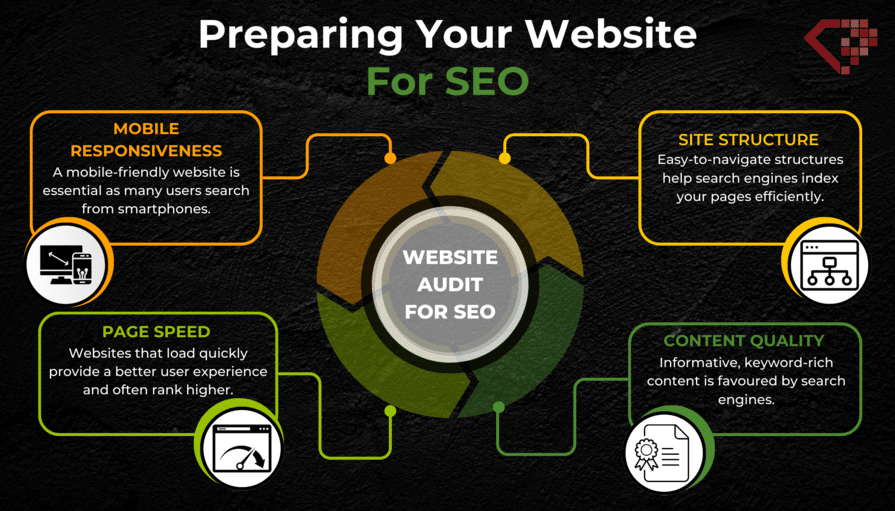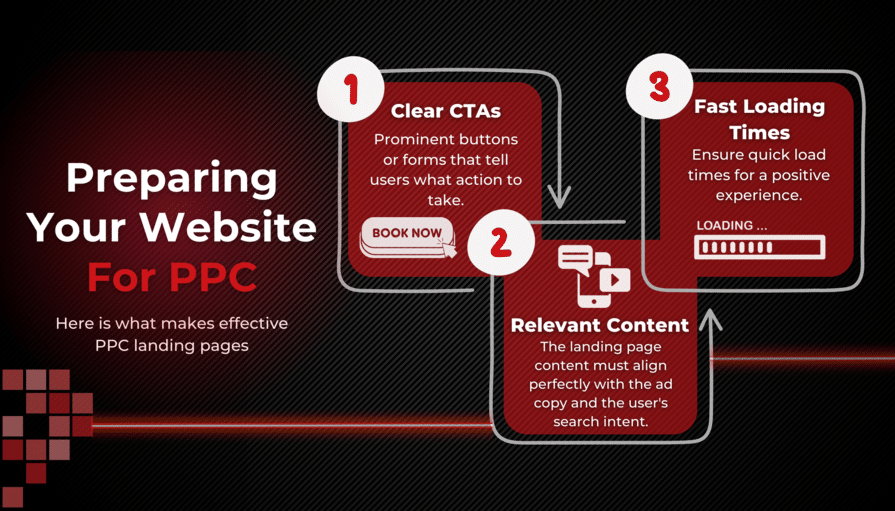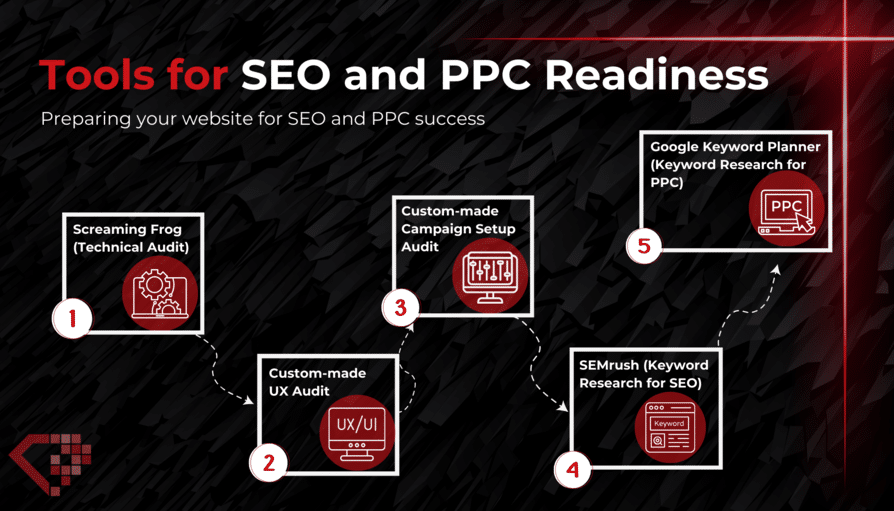Search Engine Optimisation (SEO) and Pay-Per-Click (PPC) advertising are two of the most powerful tools in a digital marketer’s arsenal. SEO helps your website rank higher in organic search results, increasing its visibility to potential customers searching for relevant terms. PPC allows you to place targeted advertisements directly on search engine results pages (SERPs), driving immediate traffic to specific landing pages.
But before diving headfirst into these campaigns, ensuring your website is optimised for success first is a wise move. By taking the time to prepare, you will improve your chances of achieving higher rankings, attracting more qualified leads, and maximising your advertising spend.
This blog post will guide you through how to evaluate a website‘s readiness for SEO and PPC, helping you achieve greater online visibility. Let us get started!
Understanding SEO and PPC
SEO Basics
Search Engine Optimisation (SEO) is the practice of improving your website’s visibility and ranking in organic (non-paid) search results on engines like Google, Bing, and others. When your website ranks higher for keywords relevant to your business, potential customers searching for those terms are more likely to discover and visit your site.
Here are some key SEO elements:
- Keywords: These are the words and phrases people use when searching for products or services related to your business. Understanding and strategically using these keywords throughout your website helps search engines match your content to relevant searches.
- Content quality: Providing informative, valuable content that naturally incorporates relevant keywords will attract both search engines and potential customers. Search engines favour websites that offer a wealth of useful information.
- User Experience (UX): Designing a website that is easy to navigate, loads quickly, and is visually appealing creates a positive user experience. This is important because search engines consider user satisfaction when ranking websites.
PPC Fundamentals
Pay-Per-Click (PPC) advertising offers a way to gain immediate visibility on search engine results pages (SERPs) by placing paid advertisements. You bid on specific keywords related to your business, and your ads have the potential to appear when users search for those terms. The “pay-per-click” aspect means you only incur costs when someone clicks on your ad.
Here are some key PPC components:
- Ad copy: Your ads need compelling text that clearly highlights your offer and entices users to click. Think of it as a mini-sales pitch designed to attract attention.
- Keywords: Like with SEO, relevant keywords are crucial for targeting your PPC ads to the right audience. Careful keyword research helps ensure your ads are shown to people who are most likely to be interested.
- Landing pages: The specific page a user “lands” on after clicking your ad, should be meticulously designed to convert visitors into leads or customers. These pages need a clear purpose, targeted content, and strong calls to action.
Preparing Your Website for SEO
Website Audit for SEO
Before embarking on any SEO campaign, a thorough website audit is an excellent idea. This analysis provides a snapshot of your website’s current SEO health, revealing both strengths and areas for improvement.
Key areas evaluated in an SEO audit include:
- Site structure: Easy-to-navigate structures help search engines index your pages efficiently and improve the user experience.
- Mobile responsiveness: A mobile-friendly website is essential as many users search from smartphones.
- Page speed: Websites that load quickly provide a better user experience and often rank higher in search results.
- Content quality: Informative, keyword-rich content is favoured by search engines and potential customers alike.
At Ruby Digital, we understand the power of a comprehensive website audit. Our expert analysis lays the foundation for successful SEO strategies by pinpointing and addressing any potential obstacles that could hinder your rankings.
Improving On-Page SEO
On-page SEO focuses on optimising specific elements within your web pages to enhance their relevance and appeal to search engines. Here are some key strategies:
- Title tags and meta descriptions: These snippets visible on search results pages should be clear, concise, and include relevant keywords to entice users to click.
- Headers (H1, H2, etc.): Well-structured headers break up content, guide readers, and signal important topics to search engines.
- High-quality, relevant content: Creating valuable content packed with relevant keywords demonstrates your expertise and helps search engines understand your website’s focus.
- Website structure: A clear and logical structure ensures search engines crawl and index your pages efficiently. Ruby Digital understands how an optimised website structure positively contributes to a more comprehensive SEO strategy.

Preparing Your Website for PPC
Website and Landing Page Optimisation for PPC
Landing pages are the heart and soul of successful PPC campaigns. These are the dedicated pages where users “land” after clicking on your ads, and they need to be carefully designed to drive conversions.
Here is what makes effective PPC landing pages:
- Clear CTAs (Call to Actions): Prominent buttons or forms that tell users what action to take (e.g., “Get a Quote,” “Download Now,” “Buy Today”)
- Relevant content: The landing page content must align perfectly with the ad copy and the user’s search intent.
- Fast loading times: Users will not wait around for slow-loading pages. Ensure quick load times for a positive experience.
At Ruby Digital, our team knows how to create landing pages that seamlessly integrate with your PPC campaigns, driving higher conversion rates and maximising your advertising investment.
Keyword Strategy and Ad Copy Excellence
- Keyword Strategy: Building a targeted keyword strategy is crucial for reaching your ideal audience through your PPC ads. Careful analysis of search volume, competition, and relevance to your business will help you select the keywords with the highest potential for success.
- Ad Copy Excellence: Once you have your keywords, craft ad copy that is both compelling and informative. It should align with the searcher’s intent, clearly convey your value proposition, and match the messaging on your landing page for a seamless user experience.

Tools for SEO and PPC Readiness
Preparing your website for SEO and PPC success does not have to be guesswork. Here is a selection of valuable tools and resources to streamline the process:
- Screaming Frog (Technical Audit): This website crawler analyses essential technical SEO elements such as broken links, missing metadata, page speed issues, and more. It helps identify potential problems that could hinder search engine visibility.
- Custom-made UX Audit: A thorough user experience (UX) audit puts your website under the microscope from a visitor’s perspective. It evaluates navigation, design, and overall ease of use – all factors that impact both SEO and PPC landing page performance.
- Custom-made Campaign Setup Audit: Before launching campaigns, it is vital to check that keywords, ads, and landing pages are all aligned and ready to convert. A custom audit reveals any discrepancies or potential bottlenecks that need addressing.
- SEMrush (Keyword Research for SEO): SEMrush provides in-depth data on keyword search volume, competitiveness, and related terms. This helps sculpt a robust keyword strategy that drives relevant organic traffic.
- Google Keyword Planner (Keyword Research for PPC): Part of Google Ads, this tool helps you discover keywords for PPC campaigns and provides estimates on their search volume and cost-per-click.

How Ruby Digital Leverages These Tools for Website Evaluation
At Ruby Digital, we do not just use these tools – we harness their power to create actionable strategies. Our expertise lies in interpreting data and translating it into a roadmap for website optimisation:
- Technical Audits: We use Screaming Frog to expose underlying issues and prioritise solutions that improve your website’s crawlability and indexation.
- UX Audits: Our custom UX audits focus on user-centricity. We identify pain points or friction that can affect conversions and SEO rankings.
- Campaign Audits: We leave no room for error. A pre-launch audit ensures your PPC campaigns are structured for optimal performance, from accurate targeting to compelling ad copy.
- Keyword Research: With SEMrush and Google Keyword Planner, we go beyond surface-level keywords and dig into search intent to find profitable opportunities for both SEO and PPC.
Website Evaluation Checklist: Key Takeaways
Before diving headlong into SEO and PPC campaigns, consider these guidelines for evaluating a website:
- Site Structure: Is your website organised logically, allowing search engines and users to easily find relevant information?
- Mobile Responsiveness: Does your website adapt seamlessly to various devices (smartphones, tablets, desktops), ensuring a positive experience for all?
- Page Speed: Does your website load quickly? Slow loading times can negatively impact both user experience and search rankings.
- Content Quality: Is your content informative, valuable, and tailored to your target audience’s needs?
- Keyword Optimisation: Have you strategically incorporated relevant keywords throughout your website (including title tags, meta descriptions, and content)?
- Landing Page Optimisation: Do your PPC landing pages have clear calls to action, compelling content aligned with ad copy, and fast loading speeds?
In Closing
By understanding the fundamentals of both SEO and PPC, and investing in thorough website evaluations, you pave the way for increased visibility, higher-quality leads, and greater online success.
Remember, a website audit is the cornerstone of successful SEO and PPC campaigns, revealing areas for improvement. Optimising your on-page elements, content, website structure, and landing pages sets the stage for higher rankings and conversions. The right tools, combined with expert analysis, will help you gain insights and make data-driven decisions.
If you are ready to take your website to the next level, do not hesitate! Ruby Digital is equipped with the knowledge and tools to assess, optimise, and enhance your website’s readiness for SEO and PPC.
Contact us today and let our experts help you unlock the full potential of your online presence!



